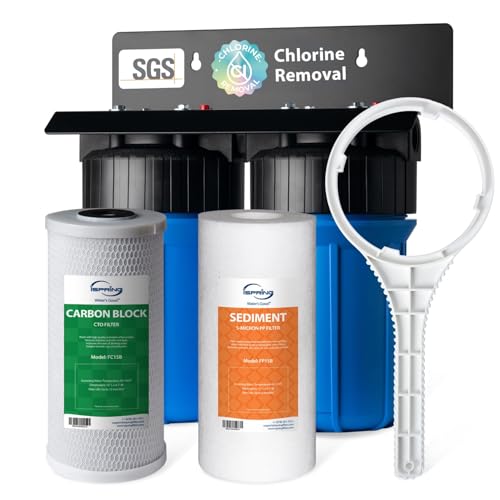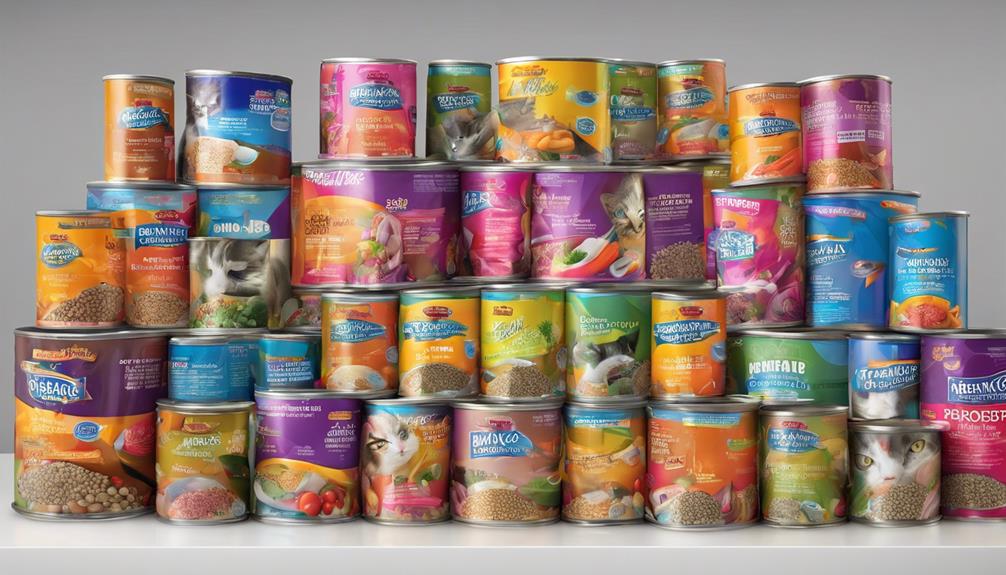When I looked into the best whole house water filter systems of 2025, I found that these systems are essential for ensuring pure, quality water throughout your home. Options like the iSpring WGB32B-DS and Express Water offer exceptional contaminant removal. You'll want to take into account factors like flow rate and filter lifespan to find the right match for your needs. Stick around to discover more about specific models and their features that can fit perfectly in your home.
Key Takeaways
- Whole House 3-Stage Water Filtration Systems effectively remove sediment, chlorine, and contaminants, ideal for homeowners with well water.
- Tier1 Whole House Chloramine Filter boasts a capacity of 900,000 gallons, ensuring long-lasting water quality improvement.
- Waterdrop features a 5-stage filtration process, effectively reducing sediments, chlorine, and lead, enhancing the taste of your water.
- iSpring offers easy DIY installation and protects against iron and manganese with a lifespan of up to 100,000 gallons.
- Regular maintenance and timely filter replacements are essential for optimal performance across all water filtration systems.
iSpring Whole House Water Filter System (Model: WGB32B-DS)
If you're looking for a reliable and effective solution to improve your home's water quality, the iSpring Whole House Water Filter System (Model: WGB32B-DS) stands out with its impressive 3-stage filtration system. This system efficiently removes sediment, chlorine, and rust while preserving healthy minerals. I love that it's DIY-friendly with clear instructions, making installation a breeze. Plus, the spin-down sediment filter allows for easy maintenance. Users rave about the improved taste and clarity of their water, along with no more calcium spots on fixtures. With a 1-year warranty and lifetime support, it's a solid investment for any homeowner.
Best For: Homeowners seeking an effective and easy-to-install whole house water filtration solution that enhances water quality while preserving essential minerals.
Pros:
- 3-stage filtration system effectively removes sediment, chlorine, and rust, improving water taste and clarity.
- DIY-friendly installation with clear instructions and robust design ensures ease of setup and maintenance.
- Lifetime technical support and a 1-year warranty provide peace of mind and assistance when needed.
Cons:
- No TDS reduction, which may not be suitable for those looking to eliminate total dissolved solids in their water.
- Replacement cartridges may incur additional costs over time, requiring regular maintenance.
- Initial investment cost may be higher compared to basic water filters, but offers long-term savings with high capacity.
Culligan Whole House Water Filter System (WH-HD200-C)
The Culligan Whole House Water Filter System (WH-HD200-C) stands out as an excellent choice for homeowners looking to enhance their water quality while protecting their appliances. With its heavy-duty design and a maximum flow rate of 10 gallons per minute, this system effectively removes sediment, rust, and chlorine tastes. I appreciate the battery-operated filter change timer and the easy filter replacement process. While some users faced installation challenges, I found that using silicone grease on the O-rings helped prevent leaks. Overall, this system boasts a solid 4.5-star rating, making it a reliable investment for cleaner water.
Best For: Homeowners seeking a reliable solution to improve water quality and protect appliances from sediment and rust.
Pros:
- Effective filtration that significantly improves water taste and quality by removing sediment, rust, and chlorine tastes.
- Heavy-duty construction with stainless steel reinforced connectors ensures durability and longevity.
- Convenient features such as a battery-operated filter change timer and straightforward filter replacement process enhance user experience.
Cons:
- Installation challenges may arise due to the size of the 1-inch fittings and the need for additional adapters.
- Potential leakage issues during installation, requiring proper maintenance and use of silicone grease on O-rings.
- Professional installation may be recommended for those lacking plumbing skills, potentially increasing overall costs.
iSpring WGB21B 2-Stage Whole House Water Filtration System
For homeowners looking to improve their water quality without sacrificing essential minerals, the iSpring WGB21B 2-Stage Whole House Water Filtration System stands out as an excellent choice. Its two-stage filtration captures sediment and removes over 90% of chlorine and odors, ensuring clean water. With a capacity of 50,000 gallons, it supports a family of four for about a year. Installation is a breeze, thanks to the pre-assembled design and helpful guides. Plus, the lifetime customer support is a significant bonus. Users rave about the clear water and effective performance, making it a top pick for home filtration.
Best For: Homeowners seeking an efficient water filtration system that maintains essential minerals while effectively removing contaminants.
Pros:
- Two-stage filtration effectively captures sediment and removes over 90% of chlorine and odors.
- High capacity of 50,000 gallons supports a family of four for approximately one year.
- Easy installation with pre-assembled design and comprehensive support resources available.
Cons:
- Some users have reported minor leaks that required assistance from customer support.
- Filter changes may be needed annually, which can be inconvenient for some homeowners.
- Limited removal of certain contaminants compared to reverse osmosis systems.
Express Water Whole House Water Filter System
Looking for a reliable way to guarantee clean drinking water for your entire home? The Express Water Whole House Water Filter System might just be what you need. Its 3-stage filtration effectively reduces hazardous contaminants like mercury and lead, enhancing your water's taste and clarity. With durable stainless steel construction and quick-change cartridges, maintenance is a breeze. I found installation straightforward, either DIY or with a plumber. Users rave about improved water quality and positive health impacts. Plus, Express Water's customer support is responsive and helpful. It's an excellent choice for anyone concerned about municipal or well water quality.
Best For: Those looking for an effective solution to improve their home's water quality, especially in areas with municipal or well water concerns.
Pros:
- Highly effective 3-stage filtration system that reduces hazardous contaminants such as mercury and lead.
- Durable stainless steel construction and quick-change cartridges make maintenance easy and hassle-free.
- Positive user feedback highlights significant improvements in water taste, odor, and overall quality.
Cons:
- Requires filter replacements approximately every six months, which can add to long-term costs.
- Initial installation may require professional help, leading to additional expenses for some users.
- Some users may need to purchase a pre-filter separately to maximize the system's lifespan.
iSpring WF150K Whole House Central Water Filtration System
Designed specifically for households with 2-3 bathrooms or up to 5 bathrooms, the iSpring WF150K Whole House Central Water Filtration System delivers extensive filtration that tackles contaminants like chlorine, lead, and heavy metals. I love that it's installed at the main water entry, ensuring clear, great-tasting water throughout my home. With minimal maintenance and no filter changes needed, it saves me time and money. The digital control valve makes managing auto-flush intervals easy. Plus, iSpring's customer service has been fantastic, helping me with installation and follow-ups. Overall, it's a smart investment for anyone seeking better water quality.
Best For: Homeowners with 2-5 bathrooms seeking a low-maintenance water filtration solution that improves water quality throughout their entire house.
Pros:
- Minimal maintenance required after setup, saving time and effort.
- No filter changes needed, leading to long-term cost savings.
- Excellent customer service with prompt support and follow-ups.
Cons:
- Some users reported issues with specific contaminants like iron and sulfur odors.
- Mixed experiences with installation effectiveness, particularly for high iron levels.
- Warranty registration process may be confusing for some users.
PRO+AQUA Elite Series GEN2 Whole House Water Filtration System
If you're part of a small to medium household with 1-3 bathrooms, the PRO+AQUA Elite Series GEN2 Whole House Water Filtration System could be your ideal solution for cleaner, better-tasting water. This 3-stage system effectively filters both city and well water without needing electricity or backwashing. It starts with a sediment filter to catch dirt and rust, followed by a CRK filter that reduces heavy metals and odors. Finally, the activated coconut shell carbon filter tackles chlorine and VOCs. With easy installation, low maintenance, and a money-back guarantee, I'm confident this system will enhance your home's water quality considerably.
Best For: Households with 1-3 bathrooms seeking a cost-effective and efficient whole house water filtration solution.
Pros:
- Easy Maintenance: No regeneration, backwashing, or electricity required for operation.
- Improved Water Quality: Effectively reduces heavy metals, chlorine, and odors for better-tasting water.
- Durability and Support: Built with pro-grade materials and backed by a 5-year manufacturer warranty and lifetime tech support.
Cons:
- Installation Complexity: Some users may find installation challenging and recommend hiring a plumber.
- Clear Instructions Needed: A few customers noted the lack of detailed installation instructions.
- Housing Cracks: Some users experienced issues with cracks in the filter housings, emphasizing the need for careful installation.
Waterdrop Whole House Water Filter System (WD-WHF21-PG)
The Waterdrop Whole House Water Filter System (WD-WHF21-PG) is an excellent choice for homeowners who prioritize clean, great-tasting water throughout their entire house. Its 5-stage filtration process effectively reduces sediments, chlorine, lead, and more, thanks to its natural coconut shell GAC filter that enhances flavor. Installation's a breeze, with all necessary materials included, though I recommend polypropylene fittings for leak prevention. Users rave about improved water quality and stable flow, having passed over 100,000 tests. Just remember to monitor filter status regularly, as the opaque housing can make it tricky to see when replacements are due.
Best For: Homeowners looking for a comprehensive water filtration solution that enhances taste and removes contaminants throughout their entire house.
Pros:
- Effectively reduces chlorine, lead, and sediment for improved water quality.
- Easy installation with all necessary materials included, ensuring a user-friendly setup.
- Durable construction and reliable performance, having passed over 100,000 water hammer tests.
Cons:
- Opaque housing makes it difficult to visually inspect filter status.
- Requires regular maintenance and monitoring of filter replacement intervals.
- Some users may need to purchase additional plumbing fittings separately.
iSpring Whole House Water Filter System (Model: WGB32BM)
Looking for a reliable solution to improve your home's water quality? The iSpring Whole House Water Filter System (Model: WGB32BM) might be just what you need. This system protects against iron, manganese, and chlorine while filtering out sediment, taste, and odor. With its 3-stage filtration, it lasts up to 100,000 gallons, perfect for a family of four. I love how easy it is to install and maintain, plus it really enhances the taste and clarity of my water. The customer support is excellent, ensuring I'm never left in the dark. It's a great investment for pure water!
Best For: Families looking for an efficient and cost-effective solution to improve their home's water quality and reduce maintenance issues.
Pros:
- Easy DIY installation with clear instructions and video support.
- Long-lasting filters with a capacity of 100,000 gallons, suitable for a family of four.
- Excellent customer support with lifetime tech assistance and a 1-year warranty.
Cons:
- Initial investment may be higher compared to basic filters.
- Requires regular maintenance, including flushing the spin-down sediment filter.
- May not be suitable for homes with extremely high levels of iron or manganese beyond the specified limits.
2-Stage Whole Home Water Filtering System
For homeowners seeking reliable and efficient water filtration, the 2-Stage Whole Home Water Filtering System stands out as an excellent choice. With its first stage removing sand, silt, and rust, and the second stage eliminating chlorine, VOCs, and unpleasant odors, my water tastes fresh and clean. It boasts a high capacity, delivering up to 15 GPM, perfect for larger families. I appreciate the simple installation process and expert support available if needed. Plus, with NSF certification, I trust its filtration efficiency. With a customer rating of 4.6 stars, it's clear this system is a favorite among users like me.
Best For: Homeowners looking for an efficient and reliable water filtration system to ensure clean and fresh-tasting water for their families.
Pros:
- Simple installation process with clear instructions and expert support available.
- High capacity of up to 15 GPM, suitable for large water demands.
- NSF certified, ensuring reliability in filtration efficiency.
Cons:
- Filter cartridges need replacement every 4-6 months, which could be inconvenient for some users.
- Initial setup may require some plumbing knowledge for optimal installation.
- Limited information on warranty specifics might leave some customers wanting more clarity.
Express Water Whole House Water Filter System
Designed for homeowners seeking reliable water purification, the Express Water Whole House Water Filter System stands out with its robust 3-stage filtration process. It effectively reduces contaminants like mercury and lead through sediment, KDF, and carbon filters. I appreciate its durable stainless steel construction and easy installation options. After installing it, I noticed significant improvements in water clarity and taste, especially the reduction of chlorine odor. With a lifespan of up to 100K gallons and no wastewater produced, this system is both efficient and cost-effective. Plus, customer support has been fantastic, making my experience even better.
Best For: Homeowners looking for an effective and reliable whole house water filtration system to improve water quality and taste.
Pros:
- Reduces harmful contaminants like mercury and lead through a comprehensive 3-stage filtration system.
- Durable stainless steel construction ensures longevity and reliability.
- Positive customer support experiences with quick responses and assistance.
Cons:
- Requires filter replacements approximately every six months, which can add to maintenance costs.
- Initial setup may be challenging for those without plumbing experience, despite DIY options.
- Limited information on specific contaminant removal effectiveness beyond general claims.
Whole House 3-Stage Water Filtration System
If you're seeking a straightforward way to improve your home's water quality, the Whole House 3-Stage Water Filtration System is an excellent choice. This DIY-friendly system features a 3-filter set that effectively purifies your water. It starts with a 5-micron sediment filter that captures dust and rust, followed by a Granular Activated Carbon filter that removes chlorine and VOCs. Finally, the carbon block filter enhances taste, ensuring cleaner water throughout your home. The compact 2.5″ x 10″ housing makes installation easy, and it comes with all necessary fittings. You'll enjoy improved water quality and taste in no time!
Best For: Homeowners looking for an easy-to-install water filtration solution to enhance their water quality.
Pros:
- Effective Filtration: The 3-stage filter system removes a wide range of contaminants, ensuring cleaner and better-tasting water.
- DIY Installation: Comes with all necessary fittings for straightforward installation without needing professional help.
- Compact Design: The slim housing allows for easy attachment to existing plumbing systems, saving space.
Cons:
- Filter Replacement: Requires periodic replacement of filters, which can add to maintenance costs.
- Limited Flow Rate: Depending on household water usage, the system may reduce water flow temporarily during filter changes.
- Initial Cost: The upfront investment might be higher compared to basic filtration options.
Whole House 3-Stage Water Filtration System
The Whole House 3-Stage Water Filtration System stands out as an excellent choice for homeowners seeking a reliable solution for cleaner, tastier water. With its three stages of filtration, it effectively removes sediment, chlorine, and other contaminants, ensuring high-quality water throughout your home. The easy installation process and included extra sets of filters make maintenance a breeze. I've noticed a significant improvement in water taste and quality, and it's especially valuable for those with well water. Just remember to replace the filters every 4-6 months for peak performance. Overall, it's a solid investment for pure water.
Best For: Homeowners with well water or those seeking an effective solution for improving water taste and quality.
Pros:
- Effectively removes sediment, chlorine, and other contaminants for cleaner water.
- Easy installation process with included extra filters for convenient maintenance.
- Significant improvement in water taste and quality reported by users.
Cons:
- Some users have experienced issues with filter housing durability, leading to leaks and breakage.
- Filters need to be replaced every 4-6 months, which can be an ongoing cost.
- Lack of additional features like pressure gauges for monitoring filter changes.
Tier1 Whole House Chloramine Filter
For homeowners grappling with chloramine in their water supply, the Tier1 Whole House Chloramine Filter stands out as a top contender in the "Best Whole House Water Filter Systems of 2025." Its impressive 900,000-gallon capacity and 8-9 year lifespan mean you can enjoy clean, great-tasting water without frequent replacements. The advanced catalytic carbon effectively tackles chloramines, chlorine, and VOCs, improving taste and odor. Plus, its easy DIY installation and low maintenance make it a hassle-free choice. With no backwashing or drainage waste, it's an eco-friendly solution that provides pure water for drinking, cooking, and bathing throughout your home.
Best For: Homeowners looking for an effective solution to remove chloramines and improve water quality throughout their entire home.
Pros:
- Long-lasting: With a capacity of 900,000 gallons and an 8-9 year lifespan, it minimizes the need for frequent replacements.
- Eco-friendly: No backwashing or drainage waste, making it environmentally responsible.
- Easy installation: Comes pre-assembled for simple DIY setup, requiring no professional help.
Cons:
- Limited softening: Primarily designed for chloramine reduction, it may not effectively soften water.
- Initial cost: While cost-effective over time, the upfront investment may be higher compared to some alternatives.
- Not a descaler: This filter is not suitable for users specifically looking for scale prevention or water softening solutions.
SimPure Whole House Water Filter Housing (DB10P)
Crafted with reinforced polypropylene and brass components, the SimPure Whole House Water Filter Housing (DB10P) stands out as an ideal choice for homeowners seeking reliable and safe drinking water. Weighing in at just 7 pounds, it's easy to install with included tools. Its thickened threaded holes guarantee leak prevention, while compatibility with various filter cartridges makes it versatile. With a customer rating of 4.4 stars, users rave about improved water quality and easy maintenance. Just remember to check your fittings and keep spare filters handy for peak performance. This system's robust design protects your home's plumbing and appliances from sediment damage.
Best For: Homeowners looking for a reliable and effective solution to improve their drinking water quality and protect their plumbing from sediment damage.
Pros:
- Quality Construction: Made from reinforced polypropylene and brass, ensuring durability and safe drinking water.
- Easy Installation: Comes with all necessary tools and features like a built-in pressure-relief button for hassle-free filter replacements.
- Improved Water Quality: Users report significantly better water quality without a decrease in water pressure.
Cons:
- No Pre-installed Filters: The product does not include any filters, requiring separate purchases for immediate use.
- Installation Issues: Some users experienced leaks due to improper installation or lack of mounting screws.
- O-ring Maintenance: Recommendations for O-ring replacement may be necessary for optimal performance over time.
Aquaboon 3-Stage Whole House Water Filter System
Looking for a reliable solution to improve your home's water quality? The Aquaboon 3-Stage Whole House Water Filter System caught my attention. Its combination of pre-filter, KDF, sediment, and carbon filters effectively removes sand, heavy metals, and chlorine, enhancing taste and safety. I appreciated the leak-resistant design and easy installation, complete with necessary tools. While some users reported minor issues with filter integrity, customer support offered solid assistance. Overall, I felt satisfied with the significant improvements in water quality and the system's durability. If you're grappling with hard water, this filter could be a game-changer for your home.
Best For: Homeowners seeking an effective and reliable whole house water filtration system to improve water quality and taste.
Pros:
- Effective Filtration: Removes sand, heavy metals, chlorine, and VOCs, significantly enhancing water quality.
- User-Friendly Installation: Comes with all necessary installation tools and a leak-resistant design for easy setup.
- Customer Support: Offers responsive support for filter replacements and maintenance issues.
Cons:
- Filter Integrity Issues: Some users reported problems with filter durability, including cracks in the KDF filter.
- Potential Pressure Loss: A few users experienced loss of water pressure shortly after installation.
- Installation Complexity: DIY experience may be required, and installation instructions could be clearer.
Factors to Consider When Choosing a Whole House Water Filter System

When I'm choosing a whole house water filter system, I consider several key factors that really matter. Filtration stages, flow rate, and how well it removes contaminants are at the top of my list. I also think about installation complexity and how often I'll need to maintain or replace the system.
Filtration Stages and Types
Understanding the filtration stages and types is essential for selecting the right whole house water filter system for your needs. Most systems use multiple stages, starting with sediment filters that tackle larger particles like dirt and rust. Next, activated carbon filters reduce chlorine, VOCs, and unpleasant odors. I often find a three-stage configuration effective: a 5-micron sediment filter, a carbon block for chlorine and odor, and an additional stage for heavy metals or specific contaminants. It's vital to analyze your water quality to choose the appropriate filtration stages. Don't forget about maintenance; some filters need replacing every 6-12 months, while others last longer. This can affect both the frequency and cost of upkeep for your system.
Flow Rate Capacity
Choosing the right flow rate capacity for your whole house water filter system is essential for ensuring consistent water pressure throughout your home. Flow rate, measured in gallons per minute (GPM), typically ranges from 5 to 15 GPM for standard systems. If you have a larger household or multiple bathrooms, opting for a higher flow rate is important, as it allows several water outlets to function simultaneously without a drop in pressure. It's critical to select a system that meets or exceeds your household's peak demand to avoid interruptions during busy times. Keep in mind that the type of filters can also affect flow rates, so consider both the flow rate and the system's ability to maintain pressure for reliable performance.
Contaminants Removal Efficiency
Contaminant removal efficiency is a crucial factor in selecting a whole house water filter system. I've noticed that these systems vary considerably in their ability to tackle specific contaminants like sediment, chlorine, heavy metals, and VOCs. When I look for a filter, I pay attention to the filtration efficiency, often measured in microns. Most effective systems use filters ranging from 5 to 20 microns to catch larger particles. I also consider advanced technologies like activated carbon and KDF, which can reduce harmful substances like lead and mercury. Additionally, the filter's capacity—some handle up to 100,000 gallons—matters. Finally, I check for NSF/ANSI certification to verify the system meets safety and performance standards.
Installation Complexity
When I consider a whole house water filter system, installation complexity often plays a key role in my decision. I appreciate that many systems are DIY-friendly, requiring just basic tools and clear instructions. Some come pre-assembled on mounting brackets and include all necessary accessories like wrenches and guides, which simplifies setup. I also find that standard 1-inch NPT fittings work with most plumbing, though I might need adapters for unique configurations. For those with limited plumbing experience, I recommend seeking professional help, especially with complex systems. Proper installation is vital to avoid leaks, so I always use silicone grease on O-rings and make sure connections are tight. This attention to detail enhances reliability and gives me peace of mind.
Maintenance and Replacement Frequency
While considering a whole house water filter system, I find that understanding maintenance and replacement frequency is vital for ensuring long-term performance. Typically, you'll need to replace filters every 3 to 12 months, depending on the system and water quality. For instance, sediment filters should be replaced every 6 months to prevent clogging. Activated carbon filters often need changing every 4 to 6 months, as their effectiveness decreases over time. Some advanced systems boast filters that can last up to a year or can treat 100,000 gallons of water. Regular maintenance not only guarantees cleaner water but also extends your system's lifespan and minimizes plumbing issues caused by sediment buildup. Keeping track of these intervals is essential for peak performance.
Warranty and Support Options
After ensuring proper maintenance and replacement frequency for your whole house water filter system, it's time to evaluate warranty and support options. I always check the warranty period—some systems only offer a one-year warranty, while others extend up to ten years with registration. It's also essential to find manufacturers that provide lifetime technical support. This can really help with installation and troubleshooting. A money-back guarantee can give me peace of mind, allowing for returns if the product doesn't meet my expectations. I also verify the availability of replacement filters and check user feedback on customer support experiences. Positive reviews here often signal reliable assistance for any post-purchase concerns, making my decision a lot easier.
Size and Compatibility
Choosing the right size and guaranteeing compatibility of a whole house water filter system is vital for its effectiveness and functionality. First, I check the inlet and outlet sizes to confirm they match my plumbing, typically ranging from 3/4 inch to 1 inch for ideal flow rates. I also consider the system's dimensions and weight, especially if I have limited installation space. It's important that the filter can handle my household's peak water demand, measured in gallons per minute (GPM). I review the filter housing sizes, commonly found in standard dimensions like 10"x4.5" or 20"x4.5", to assure easy replacement. Finally, I verify that the system is designed for my specific water supply type, whether it's well or municipal.
Budget and Cost Effectiveness
When I consider a whole house water filter system, budget and cost-effectiveness are essential factors that can greatly impact my decision. The initial cost can range from a few hundred to several thousand dollars, and I need to weigh that against the system's filtration capabilities. I also take into account the long-term expenses, like filter replacements. Some systems need changes every six months, while others can last a year or more. I appreciate the potential savings on bottled water, as a good filtration system can reduce my reliance on store-bought options. Finally, I look for warranties or customer support to help with future costs, and I analyze the system's capacity to guarantee it meets my household's needs effectively.
Frequently Asked Questions
How Often Do I Need to Replace the Filters?
I've found that replacing filters every 6 to 12 months is a good rule of thumb, but it really depends on your water quality and usage. If I notice a drop in water pressure or a change in taste, I'll check the filters sooner. Regular maintenance not only guarantees clean water but also extends the life of the system. Keeping track of my filter changes has made a noticeable difference in my home's water quality.
Can I Install a Whole House Filter Myself?
Did you know that nearly 15% of homeowners tackle DIY plumbing projects? I've found that installing a whole house filter can be a viable option for those with some handy skills. If you're comfortable with basic plumbing and have the right tools, you can definitely do it yourself. Just make sure to follow the manufacturer's instructions closely and check local regulations. It's rewarding to know you've improved your home's water quality!
What Contaminants Do These Systems Remove?
When I looked into whole house water filters, I discovered they remove a variety of contaminants. They tackle chlorine, sediment, and heavy metals like lead, ensuring my water tastes better and is safer. Some systems also eliminate bacteria, pesticides, and volatile organic compounds. It's amazing how much cleaner my water feels after filtering out these harmful substances. I've noticed a significant difference in both my drinking and cooking water quality!
Are These Systems Suitable for Well Water?
When I think about drinking clean water, I imagine that crystal-clear glass versus the murky stuff I sometimes find in my well. So, are whole house water filter systems suitable for well water? Absolutely! Most systems are designed to tackle various contaminants, including those often found in well water, like sediments and bacteria. Just make sure to choose one specifically rated for well water to guarantee it meets your needs effectively.
How Much Maintenance Do Whole House Filters Require?
Maintaining whole house filters isn't too overwhelming, but it does require some attention. I usually check the filter every six months and replace them annually, depending on the specific system I have. I've found that cleaning the pre-filters regularly helps keep everything running smoothly. It's essential to follow the manufacturer's guidelines, as they can vary. Overall, I've discovered that a little maintenance goes a long way in ensuring clean water.
Conclusion
As I stand at the edge of a crystal-clear lake, I'm reminded of the purity we all deserve in our homes. Choosing the right whole house water filter system is like planting a tree; the roots you establish today will nourish your family's health for years to come. So, take the time to explore your options and invest in a filter that guarantees every drop you drink is as invigorating as nature intended. Your home deserves it.
























